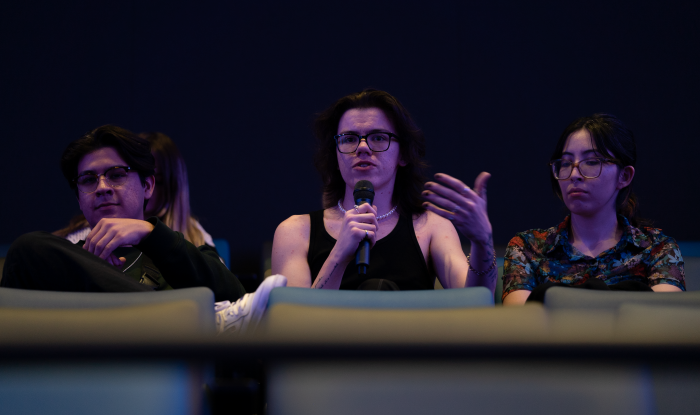The Sidney Poitier New American Film School launches faculty-curated screening series

Clinical Assistant Professor Brian McAuley addresses the audience following a screening of "Talk to Me." Photo by Taylor Blackmore
Everyone knows movies are better on the big screen. The Sidney Poitier New American Film School is proving it with a new faculty-curated screening series, launched in October, that brings classics new and old to the state-of-the-art theater at ASU’s Media and Immersive Experience (MIX) Center in downtown Mesa.
"Cinema isn't just an art form, it's a communal experience,” said Brian McAuley, clinical assistant professor in The Poitier Film School. “It's increasingly invaluable to experience films the way they were intended: on a big screen with booming speakers and a lively audience.”
The screenwriter and horror novelist, whose new Christmas-themed horror book “Candy Cain Kills Again: The Second Slaying” comes out Nov. 12, kicked off the screening series with "Possession at the MIX," presenting a pair of thematically linked horror films about possession: the iconic 1973 film “The Exorcist,” and the 2022 Australian horror film “Talk to Me,” about a group of young friends who play a party game with an embalmed hand that unleashes a terrifying supernatural force.
The Poitier Film School screening series continues in November with John Carpenter’s classic 1982 chiller “The Thing” on Monday, Nov. 4; and Jordan Peele’s 2022 sci-fi/horror epic “Nope” on Nov. 19. All screenings are free and open to the public.
“With this screening series, we're intentionally pairing a classic genre film with a modern masterpiece, connected by a common theme,” McAuley said. “We're also holding space after the films for conversations about the artistry and humanity that make these stories endure across generations. For example, we explored how the religious horror of ‘The Exorcist’ resonates today compared to the TikTok terrors of ‘Talk to Me.’"
Many of the MIX Center theater’s 261 seats at the Oct. 22 screening of “Talk to Me” were occupied by Poitier Film School students studying the art and craft of film, who stayed seated after the screening to engage in a post-film discussion led by McAuley.
McAuley, who teaches screenwriting, emphasized the importance of well-drawn characters to secure the audience’s emotional investment.
“What makes the story work is that it’s really rooted in characters,” he said of “Talk to Me” in the post-screening discussion, calling it a “character-driven drama that happens to have horror mixed in.”
“When a horror movie can make you feel so many emotions other than fear, it makes the whole story so much better,” responded one film student.
Rodrigo Meirelles, a sonic artist and Poitier Film School professor of sound, was also in attendance for the screening and contributed his expertise to the discussion, calling attention to how the mood and emotional tone of the film was enhanced by the score and sound design.
“The variation of volume and intensity is astounding,” Meirelles said.
The film’s expert sound design was especially evident in the MIX Center’s theater, which is Dolby Atmos certified, a rare distinction.
“Movies were made to be enjoyed on the big screen, and we’ve got one of the best big screens in Arizona at the MIX Center,” said Poitier Film School Founding Director Cheryl Boone Isaacs. “Our expert film faculty are curating a thrilling series, screenings classics and new releases that both inform and entertain. Our students will learn not just film history, but how films remain in conversation with one another across the decades.”
One audience member at the screening of “Talk to Me” expanded her cinematic horizons in a big way.
“This is my first horror film that I’ve ever seen, because I don’t like horror,” said Jennifer Hankerson, a film and media production major. “It was a good first horror film, I would say.”
“Was it scary?” McAuley asked.
“Oh yeah,” she confirmed.
More Arts, humanities and education

ASU’s Humanities Institute announces 2024 book award winner
Arizona State University’s Humanities Institute (HI) has announced “The Long Land War: The Global Struggle for Occupancy Rights” (Yale University Press, 2022) by Jo Guldi as the 2024…

Retired admiral who spent decades in public service pursuing a degree in social work at ASU
Editor’s note: This story is part of coverage of ASU’s annual Salute to Service.Cari Thomas wore the uniform of the U.S. Coast Guard for 36 years, protecting and saving lives, serving on ships and…

Finding strength in tradition
Growing up in urban environments presents unique struggles for American Indian families. In these crowded and hectic spaces, cultural traditions can feel distant, and long-held community ties may be…
